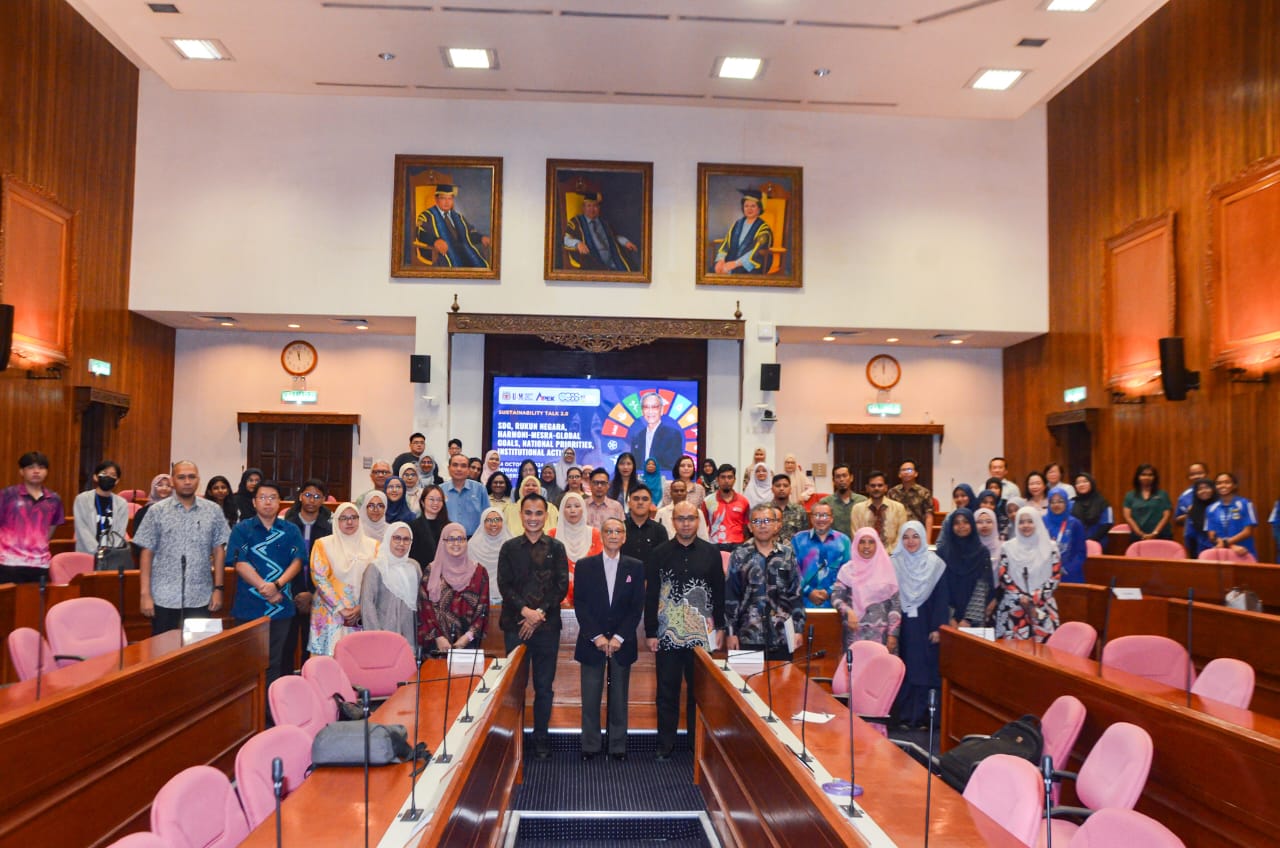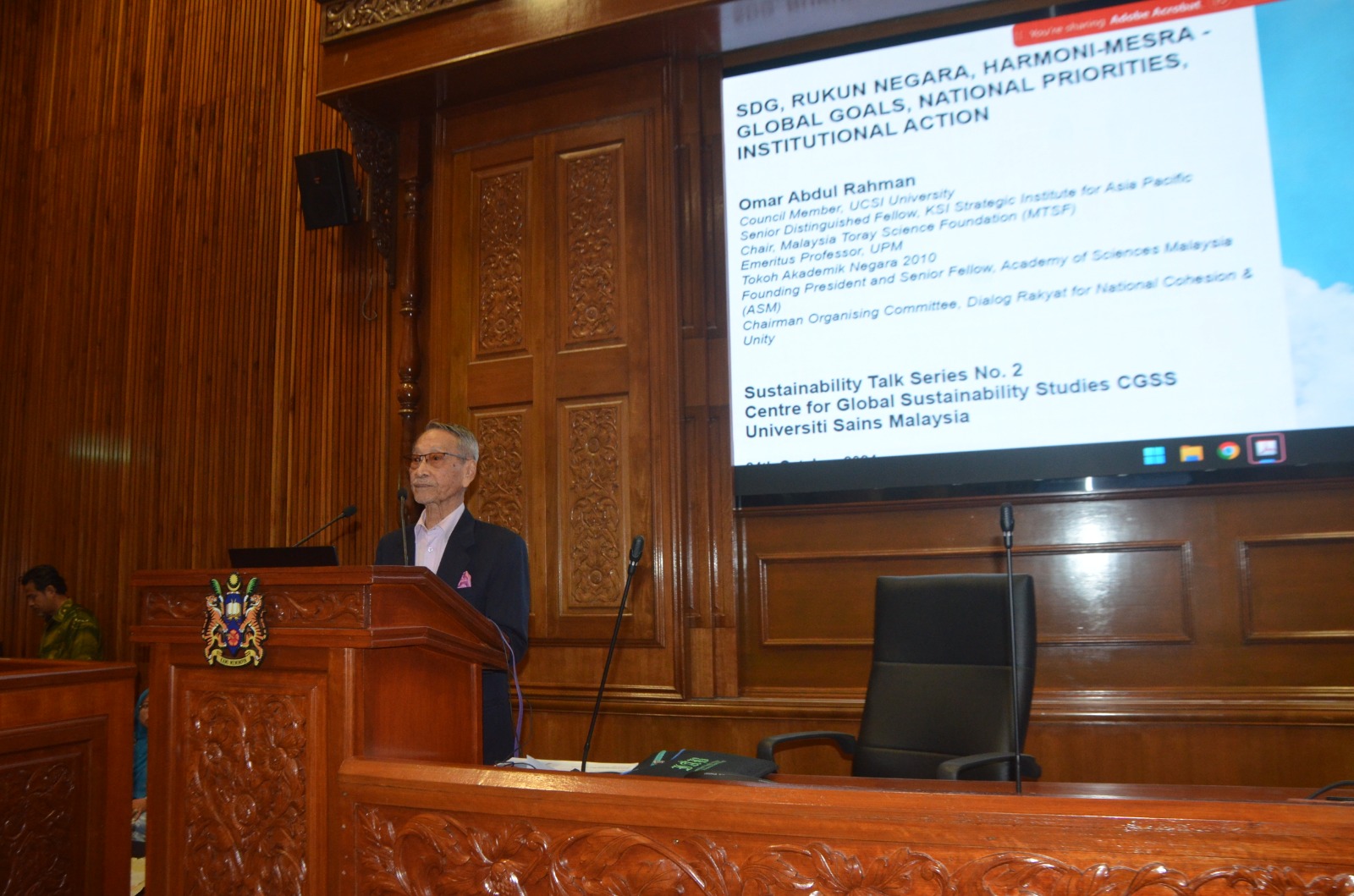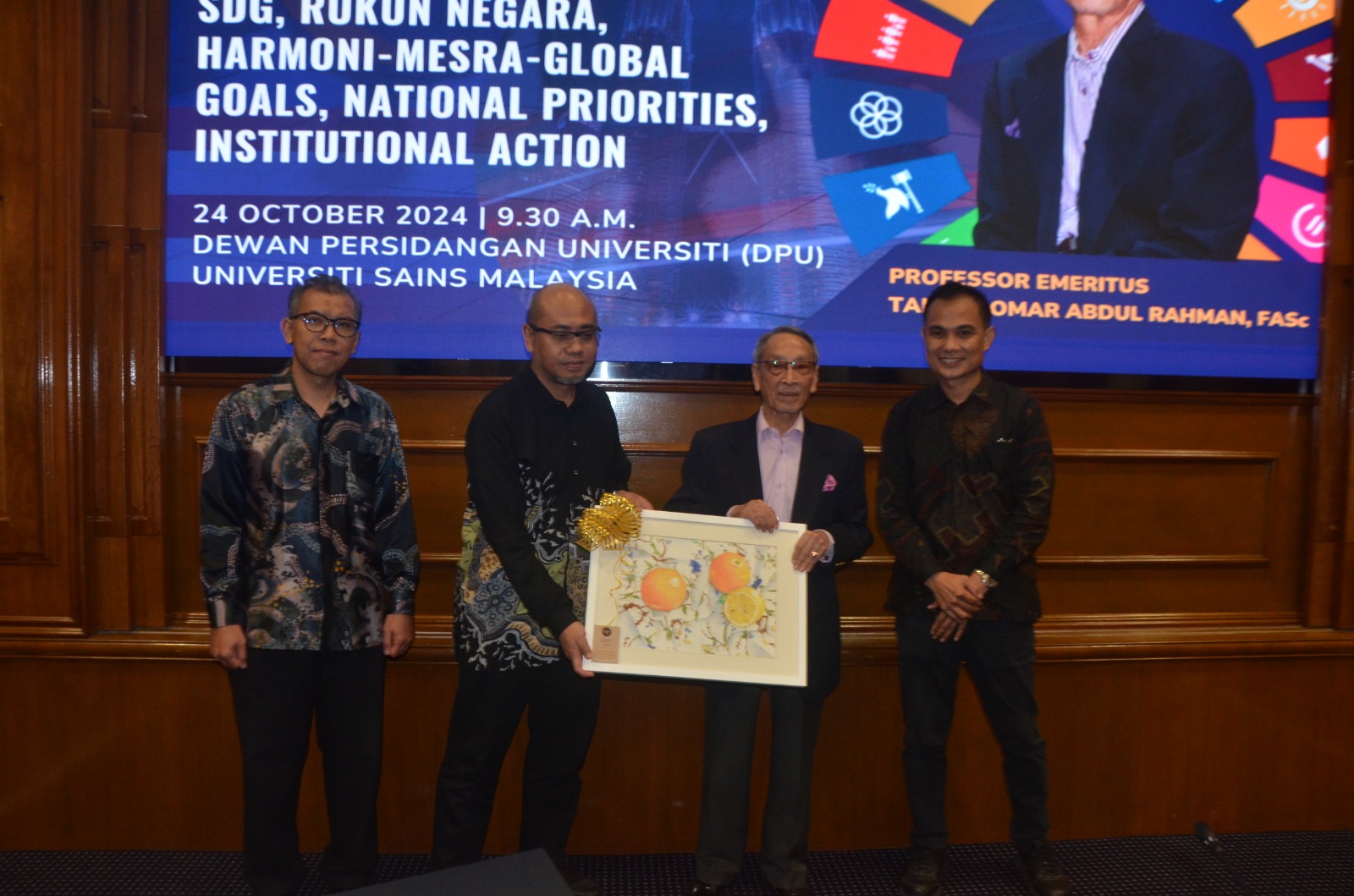USM HOLDS SUSTAINABILITY TALK 2.0 ON ‘SUSTAINABILITY AND RUKUN NEGARA’ BY UCSI SCHOLAR

USM PENANG, 24 October 2024 – Universiti Sains Malaysia (USM) was the venue of a talk which brings forth the connection between sustainability and the nation’s ‘Rukun Negara’.
Sustainability Talk 2.0, held at the Dewan Persidangan Universiti (DPU) in USM, was organised by the Regional Centre of Expertise (RCE) Penang under the USM Centre for Global Sustainability Studies (CGSS).
It featured guest speaker Emeritus Professor Tan Sri Omar Abdul Rahman from UCSI University, who touched on the topic of “SDG, Rukun Negara, Harmoni-Mesra: Global Goals, National Priorities, Institutional Action.”
Deputy Vice-Chancellor of Industry and Community Network, Professor Dr. Azlan Amran, who represented USM Vice-Chancellor delivered the opening speech at the programme.
He said that “USM is synonymous with sustainability, and is actively exploring various avenues in relation to sustainability.” He continued by saying, “(The speakers’s) viewpoints and insights...could surely be considered...to ensure that we will live together sustainably and in harmony.”
Prior to this, Director of the USM Centre for Global Sustainability Studies (CGSS), Associate Professor Dr. Mohd Wira Mohd Shafiei, said in his welcoming speech that, “When we talk about sustainability, it is about managing resources according to man’s behaviour. The SDGs have categorised 17 areas of resources, for mankind to be disciplined in utilising them. Our ‘Rukun Negara’ is also about discipline. It could assist in the efforts for growth and nation-building.”
Following that, Emeritus Professor Tan Sri Omar Abdul Rahman started his talk by highlighting the various plan established by the government after the 13th May 1969 civil unrest incident.
He said, “The plans were made to define national priorities, and which began with Rukun Negara in 1970, and continued with the current government’s Malaysia Madani (2023). From 1970 to 2023, there were 5 other plans by the governments of the day, to ensure the national aspirations will be achieved.”

Omar then commented that all these plans should be simplified in order to be understood and embraced by the people. He proposed going back to basics with the ‘Rukun Negara’ with its 5 principles and 5 objectives.
He pointed out that the SDGs can be effectively implemented if only there is continued focus on ACCA - Awareness, Comprehension, Commitment and Action. “The corporate sector has made substantial improvements in these areas with their ESG (environmental, social, governance) programmes. Poor cooperation and implementation however is still evident globally, as well as at the national level. This is due to the limited capacity in choosing between what is desirable and doable,” said Omar.
He said that there is the need to refer to the objectives of ‘Rukun Negara’. Though it was drawn out 54 years ago, it is still relevant to current situations. The objectives are planned to create a nation that is Harmonious, Prosperous, Progressive and Sustainable (HPPS). All these are in line with the current SDG 16 (Peace, Justice, Strong Institutions).

He continued by saying that the ‘Harmonious’ pillar is crucial part of the national priorities, as it could maintain and enhance the other three pillars in HPPS.
“This is mainly due to occurrences around the world, and also locally, where there are instances of the ‘Five Dreadful Ds’ which are: Disruptions, Displacements, Destructions, Disfigurements and Deaths. All these would be in addition to natural disasters or calamities happening in many parts of the world.”
Omar explained that “Social harmony cannot be taken for granted, in the local and more so in the global context. Social harmony needs to be sustained by means of fulfilling the basic needs, improving the quality of life and preserving the socio-cultural-religious (SCR) values and practices of the various communities. At the moment, the SCR aspect is not given enough attention, which could become a threat to social harmony.
Omar added further, efforts were made to ensure that social harmony could be maintained, one of which was the organisation of a ‘Dialog Rakyat’ in 2016.
“Up until 2019, five sessions of Dialog Rakyat had been held, and from there two concepts have been produced: ‘Code of Ethical Conduct (CEC)’ and ‘Harmoni-Mesra’.
“The two concepts would aspire to strengthen the common ‘harmony moments’ that the rakyat experience during festive seasons, national sports meet or other gathering involving the different community groups. This could also reduce the effects of ‘cultural ignorance and arrogance’, which could lead to prejudice.” Omar explained further.
He then continued to say that the increase in ‘harmony moments’ could create stronger ties at the social, rational and emotional levels in society, while embracing the Dialog Rakyat CEC that would result in an atmosphere where everyone would practice ‘Budipekerti, Budibahasa, Budibicara’ (courtesy in all aspects of life).
“This would then be extended into the Harmoni-Mesra concept, which could be explained and implemented in higher educational institutions,” he said.
Omar stated that a promotional book ‘Harmoni-Mesra Campus Programme for Malaysia – An Initiative Supporting the Objectives of Rukun Negara’ has been published, following the implementation of the programme at UCSI University by its Sekretariat Rukun Negara as part of the SDG Secretariat.
Omar then in his conclusion hopes that National Priorities can be aligned with the SDG Global Goals.
“The National Priorities are determined by the National Aspiration, which can be referred to the Rukun Negara. The National Aspiration in essence is about creating an HPPS Malaysia.
“This would be further improved by having a ‘Consistency Paradigm’, where HPPS will be in the guidelines regardless of which government that would run the country in the future,” he said.
The talk was followed by a round of Q & As, and with a number of questions entertained.
Those present at the talk include the Heads of Departments, representatives from the Ministry of Higher Education (KPT) and Toray Foundation, academics, secondary school students and USM officials.
Text: Mazlan Hanafi Basharudin
- Created on .
- Hits: 1015
